Silica is a trace mineral made up of silicon dioxide that is used in supplement form by many people to help improve the strength of skin, nails, hair, and bones.
The relationship between silica and bone health has been heavily studied in the scientific literature, and there are also some interesting findings on silica’s role in preventing cognitive decline among older adults.
Whether you want to improve your bone health, increase the radiance of your skin, or maintain your cognitive abilities into old age, silica could be a great addition to your supplemental routine.
We’ve ranked and reviewed the ten best silica supplements on the market, plus taken a close look at the scientific research behind the benefits of silica.
Research
Rankings
1. Solgar Oceanic Silica
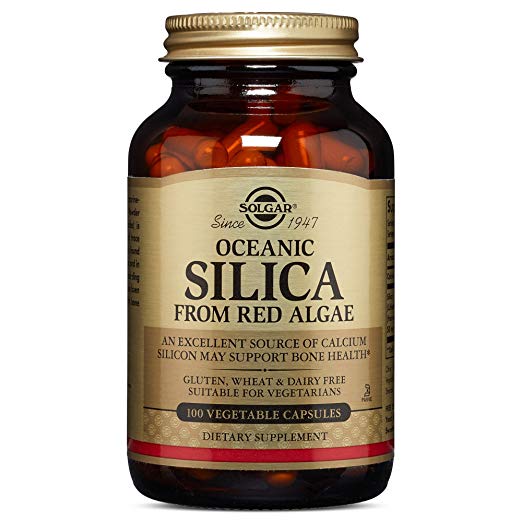
Solgar Oceanic Silica is an excellent source of natural silica, which comes from red algae. The supplement itself comes in large vegan-friendly capsules, each of which provides 54 mg of silica.
The supplement design is pretty clean, so if you want a naturally-derived silica supplement, this should definitely be your top pick
2. Eidon Silica Liquid Concentrate
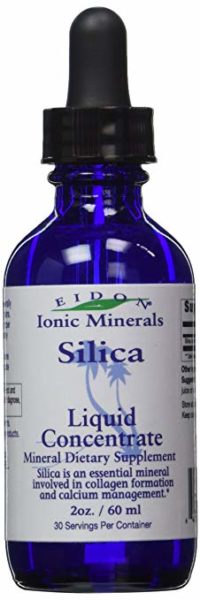
Eidon Silica Liquid Concentrate is a concentrated solution that provides 375 mg of silica per serving, and comes in a blue glass bottle with an integrated vial dropper.
The vial makes measuring out doses pretty easy, and both the purity and the concentration of silica are fantastic.
3. Orgono Living Silica
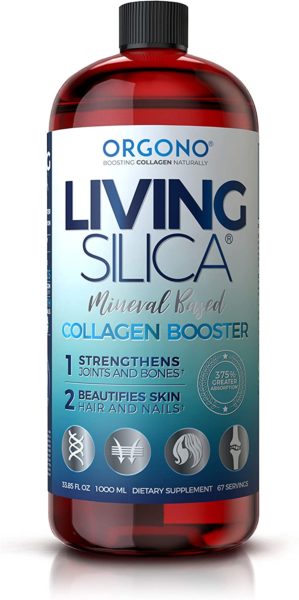
Living Silica uses a unique blend of monomethylsilanetriol and silicic acid to deliver a highly bioavailable form of silica in a simple liquid solution. Whether your goal is stronger bones, healthier skin and nails, or better brain health, Living Silica is a great, versatile liquid silica supplement.
3. Hubner Original Silica Gel
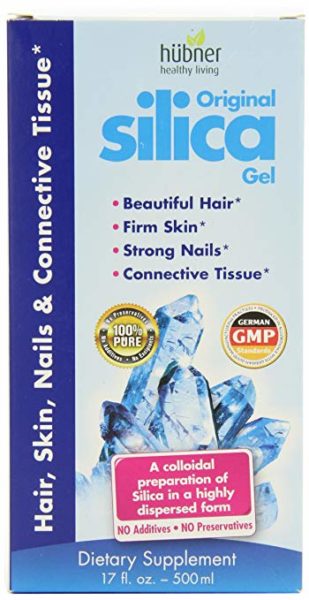
Hubner Original Silica Gel is a favorite among purists, because its only ingredients are silicic acid and purified water. The dosage level is quite high, at 420 mg per serving.
While the gel texture is not quite to everyone’s liking it’s hard to argue with the purity, dosage, and efficacy of this silica supplement.
5. Pure Ingredients Bamboo Extract
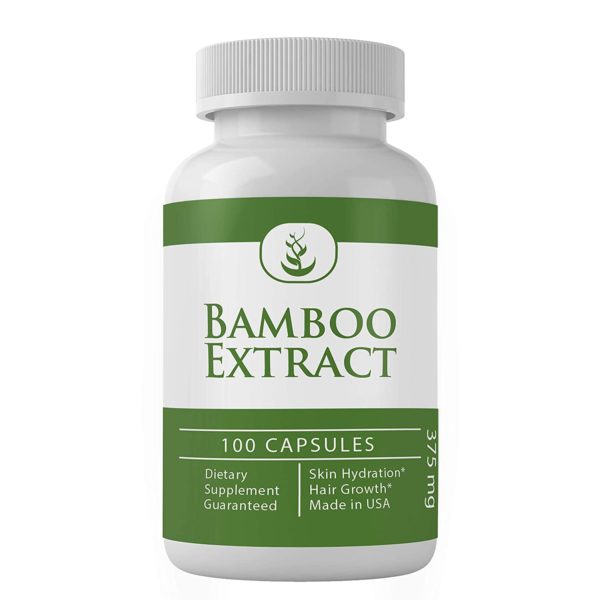
Pure Ingredients Bamboo Extract is a supplement that provides a natural source of silica that’s not the same old source used in many other supplements.
The bamboo extract used in this supplement is a naturally-sourced way to get plant-based silica. Among the natural sources of silica that comes in a tablet, it’s one of the better options.
6. World Organic Silica 500
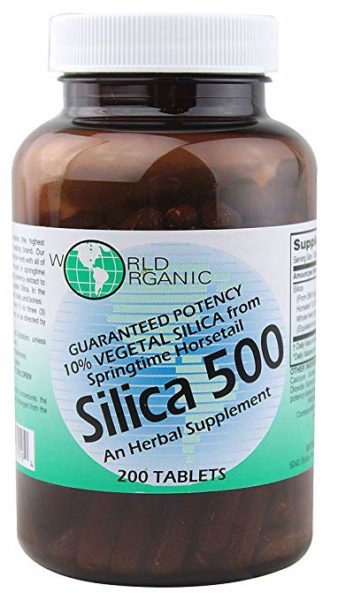
World Organic Silica 500 is a silica supplement that’s based on horsetail extract, but in this case, it is actually standardized to contain a set amount of silica.
Each tablet contains 50 mg of silica, which is on the lower end, but if you are looking for a horsetail extract source of silica, it is a pretty good option.
7. NOW Foods Silica Complex
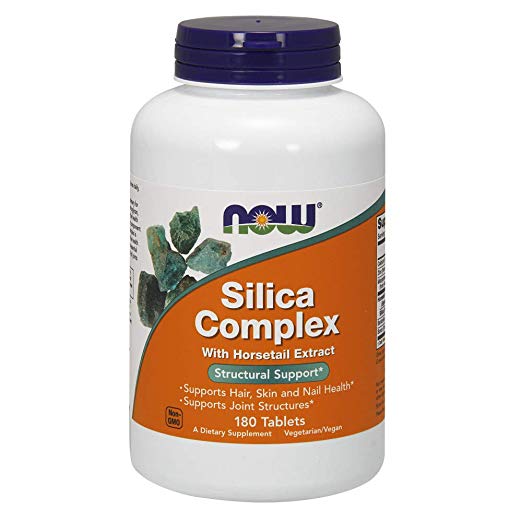
NOW Foods Silica Complex includes 40 mg of silica per tablet, which is derived from horsetail extract. It also includes a number of other trace minerals, such as calcium, zinc, manganese, and boron.
While the dosage is not as impressive as some of the other silica supplements on the market, NOW Foods Silica Complex is still a good choice if you want to get your silica from a totally natural source.
8. Zemvelo Ionic Silica
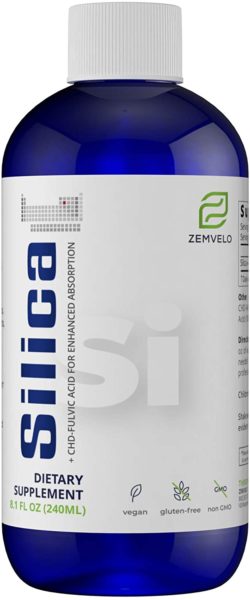
Zemvelo Ionic Silica uses purified water and silica to provide a liquid solution with a fairly high dosage of silica per serving (125 mg to be precise).
However, it does have the drawback of having some extraneous stabilizing ingredients not found in some of the other silica supplements out there, such as citric acid, fulvic acid, and sorbic acid. While it’s still an effective silica supplement, these extras knock it down a bit in the rankings.
9. SilaLive Silica
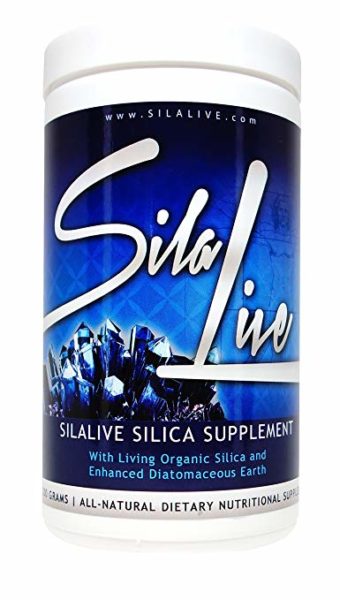
SilaLive Silica is a bit unusual among silica supplements—it’s a powder-based supplement that derives its silica from diatomaceous earth.
As a result, it is hard to estimate a precise dosage when it comes to the silica content. One serving has a predetermined amount of diatomaceous earth in it, but the silica content itself is unknown.
It’s a good option if you want to take advantage of the specific benefits of diatomaceous earth, but for pure silica, there are better options out there.
10. Alta Health Products Herbal Organic Silica
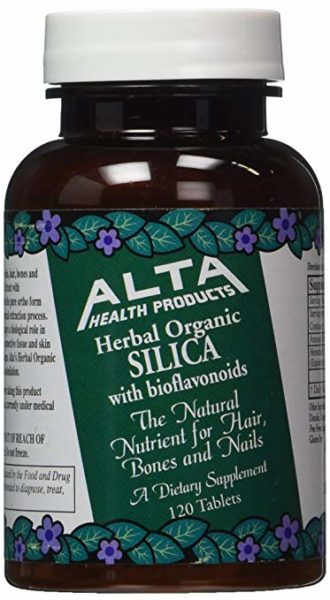
Alta Health Products Herbal Organic Silica is a tablet-based silica supplement that uses horsetail extract as a natural source of silica. Each tablet contains 500 mg of horsetail extract, but the silica content of this extract (which varies from plant to plant) is not standardized, making it hard to compare doses to other silica supplements.
Moreover, in part due to the tablet design, this silica supplement has more extraneous ingredients than other competitors, which will be a turn-off for purists.
Category winners
Best silica overall: Solgar Oceanic Silica
Using silica derived from red algae, Solgar makes an excellent all-purpose silica supplement that’s our top overall pick, thanks to its purity and simplicity.
Best silica for hair: Eidon Silica
To foster collagen synthesis with silica, go for Eidon Silica. This liquid formulation can be used in two ways: taken orally, to supply your body with silica as a nutrient, or applied topically to your scalp.
Best silica for nails: Eidon Silica
One of silica’s most popular applications is in treating brittle nails. Our pick on this front is Eidon Silica, thanks to its easy-to-use liquid form and high silica content, in the form of silicon dioxide.
Best silica for bone health: Solgar Oceanic Silica
Silica helps your body build strong, resilient bone cells, and Solgar is our pick if bone strength is your priority. It provides both silica and calcium in a simple and pure form.
Best silica for brain health: Living Silica
Living Silica uses a unique and highly bioavailable form of silica in this liquid silica supplement, making it a strong choice for anyone looking to use silica to bolster cognitive health.
Best silica for skin: Eidon Silica
Shocked that silica helps skin, too? It shouldn’t be a surprise—collagen is critical for healthy skin, too. Our pick for skin health is Eidon Silica, because it can be either taken orally or applied topically to target areas of sagging or wrinkled skin.
Who Should Buy Silica?
Silica is great for people who want to improve the strength of their hair and nails. Silica has been shown in research to decrease the brittleness of both hair and nails in women.
Silica is also great for the aging population. This is because it helps to improve density, which can help prevent bone breaks from falling. Anyone over the age of 45 should start to consider it.
It also helps to prevent cognitive decline. Specifically, silica is shown to prevent dementia from aluminium consumption (an ingredient that is notoriously found in deodorant and even drinking water). Those persons worried about dementia, should consider a silica supplement.
Silica is also great for individuals who want to heal damaged skin. Silica is a precursor to collagen production, and a potent anti-inflammatory agent. As such, it can repair damaged skin, reduce wrinkles and even help to plump up the skin and make it glow.
How We Ranked
First off, we looked at the dosage amount. There is no set recommended daily intake (RDA) for dietary silica. It is approximated that most adults eating a healthy, plant-rich diet consume between 14-62 mcg per day. According to other resources, the ideal dose of silica falls anywhere between 180mg-360mg per day, with 700mg being the absolute highest dose on a daily basis that’s recommend.
Companies like Swanson Bamboo Extract contain a happy medium of 210mg per serving ranked highly. World Silica also ranked highly, despite its lower end 50mg per serving because of the versatility it provided in tailoring doses to individuals.
Next we looked at the source of the silica supplement. Silica supplements can come from either naturally-occurring or synthetic sources. If you are looking for a natural bioactive source of silica, supplements including those from bamboo and horse chestnut are two common options that will provide you with sufficient amounts. Companies like NOW Silica Extract who used Horsetail extracts ranked highly here. Swanson was ranked highly here a well because it’s derived from bamboo.
Another source or silica, thats not as well known is red algae. However, it tends to be more expensive so you will only find it in the best products. Solgar excelled here in providing the only red algae sourced silica on our list.
Third, we looked at the delivery method. Silica primarily comes in two forms: liquids and tablets. We included both in our rankings, however we did favor tablets. The reasoning behind this, was that tablets were easier to accurately dose and are more travel friendly. As such, our numbers 1 pick Solgar ranked well here. Other companies like Orgono Living, that came in liquid form were compensated as well because they offered a high quality product compared to others. They also used less fillers and binders, which we talk about in the next section.
Lastly, we looked at additional ingredients. One important factor was that each silica supplement we chose needed to be pure. That meant they need to have minimal amounts of additives, fillers, binders and coloring agents to endure purity. If they didn’t, they were axed immediately, despite a strong reputation or sales numbers.
We mentioned above that we preferred tablets. However, we only preferred tablets, like Solgar who used minimal processing, binders and fillers. Often times, liquid forms of silica, like Eidon Silica Liquid Concentrate, were better because it required less preservatives and additional ingredients to keep the silica fresh, active and useful.
Benefits
Silica is a mineral that provides your body with silicon, which is essential for proper skeletal and connective tissue function.
Supplemental use of silica is quite popular to improve hair, skin, and nail quality, but most of the scientific research is focused on its applications in improving bone strength and preventing bone fractures in the elderly.
There’s even some evidence that silica could exert a neuroprotective effect in older adults.
Silica can heal damaged skin and improve the strength of brittle hair and nails. Silicon, the chemical element that is delivered to your body by silica supplements, plays a critical role in synthesizing the proteins that make up your skin, nails, and hair.
Research has found that taking a silica supplement can help improve the vitality of all three. A study published in 2005 in the Archives of Dermatological Research by a team of scientists in Belgium examined how skin, nails, and hair responded to a 20-week supplementation routine (1).
The study involved 50 women, all of whom had photodamaged skin. The women were split into two groups, one of which received a placebo supplement, and one of which received a capsule that provided 10 mg of elemental silicon per day (equivalent to about 22 mg of silica per day).
After the study, the researchers evaluated skin hydration, skin roughness, nail brittleness, and hair brittleness in both groups.
The results showed that the silica supplement helped make photodamaged skin smoother, and decreased brittleness in both the nails and the hair.
These results seem to confirm the widely-held belief among silica supplement enthusiasts that increasing the amount of silicon in your system can help strengthen your connective tissue, including skin, nails, and hair.
Silica could help increase your bone density. Elemental silicon doesn’t just play a role in the synthesis of connective tissue—it also plays a key role in building bone strength.
Research from large epidemiological research on nutrition provides the basis for this discovery. For example, one study published in the Journal of Bone and Mineral Research in 2009 analyzed dietary silicon intake among members of a group of almost 3000 healthy adults (2).
The researchers found a positive association between dietary silicon intake and bone mineral density among both men and women.
Supplementing with silica improves bone density by slowing down your body’s rate of bone resorption. Experimental evidence from animal studies also supports the use of silica for bone strength. A paper published in 2008 in the journal Biological Trace Element Research looked at the biochemical effects of a silicon supplement in rats who were predisposed to loss of bone mineral density (3).
By comparing the rate at which the rats’ bodies dissolved bone tissue (a process known as resorption) across a range of different diets, the researchers were able to show that a diet with supplemental silicon added was effective at reducing the rate of bone resorption, which led to a halting of bone density loss.
Both this study and the other epidemiological research make a strong case for considering silica as a critical part of a supplemental routine to maintain or increase bone density in people at risk for osteoporosis.
Of course, other supplements like calcium and vitamin D are also essential for improving bone density, so silica is not a replacement for these other important components.
Silica may help prevent the negative effects of aluminum on cognitive function in older adults. When it comes to degenerative disease of the brain, like Alzheimer’s, quite a bit of research has focused on the role of aluminum, a trace element that is thought to accumulate and contribute to brain degeneration over time.
Health experts point to higher rates of dementia in regions of the world that have higher concentrations of aluminium ions in the drinking water as evidence. Worries about aluminum account for the popularity of natural deodorants that are aluminum-free, for example.
However, interesting research suggests that silica might offer protection from the neurodegenerative effects of aluminum.
A scientific article published by researchers in France examined the issue of aluminum in drinking water in more detail by considering how silica levels in the same water modulated rates of dementia in older adults (4).
Through careful analysis of levels of silica and aluminum in drinking water and the incidence of dementia among a large sample of people in France, the researchers were able to confirm that aluminum increases the risk of dementia, but only when levels of silica are low.
High levels of silica actually appeared to be protective against dementia when aluminum was present, which provides tantalizing evidence that silica could serve as a neuroprotective agent to stave off cognitive decline in the elderly.
Side effects
Silica is a naturally-occuring compound that’s found in many kinds of foods (often absorbed from soil), so it has no documented side effects or interactions.
In powder form, like you might find in diatomaceous earth or other powdered sources of silica, it can be hazardous to breathe the dust, but unless you are making and pressing your own capsules using powdered silica, you’re unlikely to face any problems from this—merely scooping a tablespoon out to mix into your smoothie isn’t going to create any dust.
Recommended dose
For improving the strength of your skin, hair, and nails, the scientific literature supports a dosage of at least 22 mg of silica per day.
However, a higher dose might be better if your supplement does not provide silica in a particularly bioavailable form. For bone strength, epidemiological research suggests that your total dietary intake of elemental silicon should be between 30 and 45 mg per day for optimal results.
This would translate into 65-100 mg of silica per day, since silica (the mineral) contains about 54% oxygen by weight.
FAQ
What does silica do to the human body? According to a 2018 report by the University of Memphis, silica may help protect your heart health by lowering cholesterol while reducing hardening of the arteries (atherosclerosis). Silica is also a potent anti-inflammatory agent which can help bolster the immune system as well.
Is silica harmful to humans? It really depends on the type of silica and way it was ingested. Long term inhalation of silica dust can lead to lung disease, which is why there are strict laws in place to prevent this at construction sites. As a food additive, there isn’t yet evidence to suggest it’s dangerous to ingest but more research is needed on what role it plays in the body.
What are the benefits of silica? Silica has a variety of benefits. Silica can help improve hair and nail quality by decreasing brittleness and reduce hard loss (5). It is especially important for the elderly since it can combat osteoporosis, various cardiovascular disease, including strokes as well as Alzheimers and dementia.
What is silica made of? Composed of one silicon atom and two oxygen atoms, Silica appears naturally in several crystalline forms, including quartz (a prevalent element in the Earth’s crust).
Can silica cause COPD? It is possible silica inhalation may influence COPD. COPD includes chronic bronchitis and airway obstruction, bronchiectasis, and emphysema. Some cases have reported it getting so severe, respirator failure was induced.
Does silica tighten skin? Yes, silica can help tighten and firm skin (6). It also helps to reduce blemishes, wrinkles and facial pores. Because it is a strong carrier of oxygen, silica can give you a glow.
Is silica a carcinogen? Inhaling crystalline silica dust can cause silicosis, which in severe cases can be disabling, or even fatal. Crystalline silica has been classified as a human lung carcinogen.
How much silica should you take daily? It varies. Depending upon their diet, the average person ingests between 20 to 60 milligrams of silica daily. Results from people who have supplemented with silica at 375 mg per day support silica’s effectiveness and reinforce the fact that 20 to 60 milligrams per day is not adequate.
Does silica strengthen hair? Yes, silica can strengthen hair and nails in humans (7). It’s also reported that higher silicon content in the hair results in a lower rate of hair loss and increased brightness.
How much silica should I take for hair growth? Around 5000 mcg and should be taken daily to see results.
What is the difference between silicon and silicone? Silicone is a synthetic substance is rarely found in nature in its pure form, whereas silicon is a naturally occurring chemical element.
Where is silica found? It depends on the form. Non-crystalline silica is found in silicone, silicon carbide, and glass. Sand, diatomaceous earth, clay, gravel, and other forms of rock contain crystalline silica, which is quartz (the most common form).
Which foods are high in silica? The following foods are high in silica: honey, bell peppers, dried beans cooked, fish, grapes, eggplant, cherries, apples, beer, beets, celery, corn, cucumbers, dandelion, figs, kelp, and leafy vegetables.
How many types of silica are there? Silica exists in nine different polymorphs or crystalline forms.
What is silica mineral used for? Quartz is the only natural silica mineral used in significant quantities; millions of tons are consumed annually by many industries. The sand that is an essential ingredient of concrete and mortar is largely quartz, as are the sandstone and quartzite used as building stones.
Can silica cause hair loss? No, in fact it’s the opposite. Silica is a vital mineral for hair quality, improving brittleness, poor brightness, shedding and hair loss. It can also help with hair thinning in both men and women.
Can you take silica and collagen together? Yes, you can take silica and collagen together. The combination of vitamin C along with silica works together to assist in collagen formation and provide nutrients to support hair, skin and nails.
Can silica cause itchy skin? Silica can cause itchy skin by causing allergic contact dermatitis and symptoms can include redness, swelling, itching, and hives.
Can silica supplements be harmful? Yes, silica supplements can be harmful. However, because they are water-soluble, toxicity is usually easy to deal with, as the body will just pass the excess out through urination. The absolute upper safe limit (which you shouldn’t get close too) has been reported as 1,750 mg a day.
What construction materials contain silica? Stone, mortar, brick, cement, concrete, grout, tile and asphalt are all common construction materials that contain silica. If you are working with one of those, it’s important not inhale any of the dust on a regular basis.
Does the human body use silicon? Not really. It is found in skin and connective tissues in the body though. In it’s natural forms, it’s non-toxic.
Is Fiji water high in silica? Compared to most other waters, Fiji water can be high in silica. It comes from natural underground artesian source that includes trace minerals and elements including magnesium, calcium and silica. This is also reason that Fiji water has such a different feel in the mouth compared to other waters.
Is celery high in silica? Yes, celery is indeed a great source of silica.
Does collagen contain silica? Yes and no. Silica is precursor of collagen, meaning it’s required for the production of collagen. Unfortunately as you age, silica levels decline along with collagen, leading to wrinkles.
What plants are high in silica? Bamboo extracts have been touted as a source of silica. Red algae also contains silica and is a potent and natural source of it.
What is the silica rule in construction? OSHA’s standard (29 CFR 1926.1153) requires employers to take steps to protect workers from exposure to respirable crystalline silica by limiting their access.
Does silica gel absorb oil? Manufactured from sulphuric acid and sodium silicate, RD silica gel is a form of silica. It’s capable of adsorbing 40% of its weight in water vapour at 100% humidity. It is also a very effective desiccant, because of its capacity for high moisture uptake in the low RH range.
What’s worse, asbestos or silica? Asbestos tends to be worse because it requires less absorption for more damage. The main difference between the two is how people are exposed. Minimal exposure is needed to cause harm form asbestos whereas as silica needs more chronic exposure.
What are silica tablets good for? Silica tablets helps improve skin, nails and hair. They also help improve the brain by strengthening the connective tissues of the spinal cord, nerve cells, and brains which can prevent memory loss, alzheimers and dementia. Silica also helps stabilize the pancreas’s release of insulin.
What is liquid silica good for? Liquid silica is good for strengthening hair and nails. It can also help to plump skin and create a youthful glow. Liquid silica can also prevent dementia and Alzheimers by improving the neural connections in the brain. It can also combat osteoporosis by improving bone density – especially in older adults (8).
What happens if you eat silica gel? Silica gel is not hazardous on its own. However, the beads are often dipper in cobalt (II) chloride, which is a proven carcinogen. At this point, silica becomes dangerous to ingest. Poison control should be called immediately if it is consumed.
What is silica gel used for? Silica gel packets absorb moisture and keep things dry and fresh for consumers.
Is silica gel toxic? Silica gel is considered to be non-toxic. However, the gel balls can cause choking in small children, so it’s best to keep them out of children’s hands. This is why the packs say “Do Not Eat”; not because they are toxic, but because of the choking hazard.
What happens if you put silica gel in water? Silica gel acts as a sponge and will absorb any water it comes into contact with.
Can silica gel kill bed bugs? Silica gel may be able to kill bed bugs by dehydrating them. However, more research is needed to see how effective this really is.
Can silica gel dissolve in water? No, silica gel will not dissolve in water. Instead, it will absorb it, like a super sponge.
Does silica gel expire? Yes, silica gel can expire. On average, silica gel can be kept around 6-8 months before it’s considered expired.
Related Articles
Recap
Silica is a safe and effective supplement that can play dual roles. It’s a good way to improve the health of your skin, especially if it’s been damaged by sunlight, and it also combats brittle hair and nails.
Moreover, the silicon contained in silica supplements appears to play a critical role in regulating bone strength—people whose diet is high in silicon have higher bone density, and supplementing the diet of animals with silicon prevents bone resorption.
Silica may even help ward off cognitive decline and dementia in old age. When it comes to dosage, preliminary research suggests that between 22 and 100 mg of silica per day is optimal, though future work might be able to narrow this range.
Thanks to its wide range of benefits for your body, and its lack of side effects, silica is a great addition to your supplementation routine.
For BodyNutrition‘s #1 silica recommendation, click here.